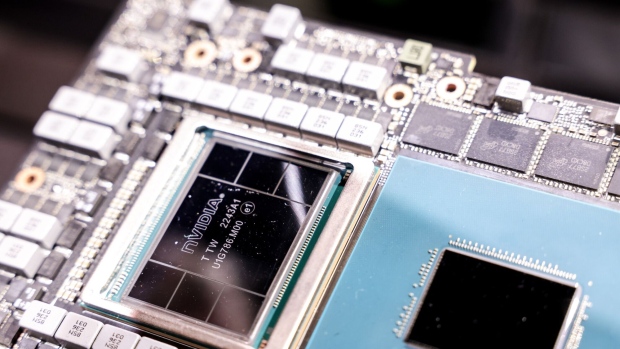Jun 27, 2023
Nvidia Leads Selloff After Report of More US AI Chip Curbs
, Bloomberg News

(Bloomberg) -- Nvidia Corp. led declines in tech stocks on a report that the US may further tighten chip-export restrictions, potentially denting sales in the world’s top semiconductor market.
Nvidia, which gets about one-fifth of its revenue from China, slid 2.4% as the market opened in New York, clawing back some earlier losses. Rival Advanced Micro Devices Inc. fell about 1.6%. The two lead the market for chips vital to the development of generative artificial intelligence models such as ChatGPT. In China, traders unloaded a slew of AI-related stocks, pushing Inspur Electronic Information Industry Co. and Unisplendour Corp. — both key hardware suppliers — down 10%.
Nvidia this year designed less-capable chips that fall under thresholds that require a license from the US Commerce Department before export to China or other countries of concern. Washington is now weighing action as soon as next month to expand the curbs to include those lower-powered semiconductors, the Wall Street Journal reported, citing unnamed sources.
Such a move underscores the Biden administration’s determination to contain China’s technological rise and could escalate tensions between the two countries. The US is increasingly concerned about Beijing’s technological ambitions, including around the use of AI in military and scientific advances that could tilt the geopolitical balance.
Read More: How China Aims to Counter US Efforts at ‘Containment’: QuickTake
While that’s likely to hurt Nvidia’s and AMD’s business with the world’s No. 2 economy, the two chipmakers remain at the forefront of a surge in AI development that’s driving investment from the US to Europe and China. From Microsoft Corp. to Baidu Inc. and ChatGPT developer OpenAI, companies around the world are buying their products to train the next generation of artificial intelligence services.
“This shouldn’t alter AI’s long-term roadmap and growth, as anything that won’t be produced in China due to restrictions will be produced elsewhere, Oddo BHF analysts said in a note on Wednesday. “This is also why we believe it’s safer to bet on equipment manufacturers to play the AI trend, as it’s a way of avoiding the risks of short-term sanctions imposed on chips manufacturers.”
ASML, which is the only company that makes the most high-end semiconductor lithography equipment needed to produce highly advanced chips, rose 1.2% in Amsterdam trading at 10:19 a.m.
Read More: ASML, Europe’s Most Valuable Tech Firm, Defines Global Chip War
US officials are also weighing whether to restrict the leasing of cloud services to Chinese AI companies, which have employed such platforms in training their models, the Journal reported, citing people familiar with the discussions. Amazon.com Inc. and Microsoft are among the world’s biggest cloud service providers. Nvidia declined to comment on the Journal report.
“Chinese AI firms may also be able to source dedicated AI chips from third party countries. So I think it will be hard for US to enforce the regulations,” said Robert Lea, an analyst at Bloomberg Intelligence. “While further restrictions could delay AI developments by Chinese firms, I don’t see a major long-term impact as Chinese firms take an increasingly innovative approach to workarounds.”
Read More: Nvidia Became ChatGPT’s Brain and Joined the $1 Trillion Club
The world’s most valuable chipmaker has a more than 80% share of the market for so-called data center accelerator chips, and had been operating under rules that required approval for shipments to China of its A100 and new H100 parts. It was able to partially alleviate the impact on its finances by selling a modified version of the A100 that’s slower at accessing data, and therefore didn’t trigger the restriction.
An AI accelerator is a graphics processor, or GPU, tailored to train AI models by feeding them tons of data. It’s better suited for such tasks than a general-purpose CPU because its architecture can do parallel work in huge volumes. Nvidia was the first to come up with a language to make GPUs do AI tasks, giving it a huge headstart over rivals like AMD and Intel Corp.
Read More: Billionaires and Bureaucrats Mobilize China for AI Race With US
AMD was also subject to the initial rules announced last August. While Nvidia’s much smaller rival emerged largely unscathed by the clampdown, Nvidia said in September the restrictions would cost it $400 million in that quarter.
The report “may have hurt sentiment today,” said Vey-Sern Ling, managing director at Union Bancaire Privee.
--With assistance from Henry Ren.
(Updates with share trading)
©2023 Bloomberg L.P.





